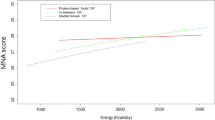Abstract
Objective: To validate the Nutrition Questionnaire for Elderly (NQE) aimed at health care personnel—and develop and validate a modified version of the questionnaire (MNQE) to improve its sensitivity in detecting elderly people with inadequate intake of specific nutrients and energy.
Design: The NQE was used to rank the nutrient intake of participants as ‘acceptable’ (OK→) or ‘at risk’ (OBS→) with respect to energy, calcium, vitamin C and vitamin D—nutrients with a high risk of deficiency, especially among the homebound or institutionalised elderly. The sensitivity, specificity and predictive capacity were calculated by means of a 4 d estimated record (study 1). Based on the results minor adjustments of the NQE was made, and the already obtained information was used to assess the theoretical validity of the MNQE (study 2). Finally the MNQE was validated in a new population (study 3).
Setting and subjects: Ninety-five old people (>65 y) living in nursing-homes (Bagsværd or Havdrup), or at home in the same home-care district (Valby) or in the same preventive home-visit district (Rødovre) were recruited. Excluded were those who declined to participate or who were in a terminal condition (n=3).
Results: The sensitivity of the NQE regarding the intakes of energy, calcium, vitamin C and vitamin D was quite low (respectively 0.46, 0.08, 0.05 and 0.38) (study 1). However minor adjustments of the NQE increased the sensitivity both in theory (energy: 0.64, calcium: 0.95, vitamin C: 1.00 and vitamin D: 0.84) (study 2) and in practice (energy: 1.00, calcium: 0.40, vitamin C: 0.86 and vitamin D: 0.85) (study 3). Modification of the NQE did not reduce the high specificity and predictive capacity of the original version.
Conclusions: Modifications of the NQE resulted in a questionnaire with a high sensitivity, specificity and predictive capacity for detecting inadequate intake of energy, calcium, vitamin C and vitamin D in elderly people.
Similar content being viewed by others
Author information
Authors and Affiliations
Contributions
Both authors contributed equally to this paper.
Rights and permissions
About this article
Cite this article
Beck, A., Ovesen, L. Modification of the nutrition questionnaire for elderly to increase its ability to detect elderly people with inadequate intake of energy, calcium, vitamin C and vitamin D. Eur J Clin Nutr 53, 560–569 (1999). https://doi.org/10.1038/sj.ejcn.1600788
Received:
Revised:
Accepted:
Published:
Issue Date:
DOI: https://doi.org/10.1038/sj.ejcn.1600788
- Springer Nature Limited
Keywords
This article is cited by
-
Home-made oral supplement as nutritional support of old nursing home residents, who are undernourished or at risk of undernutrition based on the MNA. A pilot trial
Aging Clinical and Experimental Research (2002)
-
A six months' prospective follow-up of 65+-y-old patients from general practice classified according to nutritional risk by the Mini Nutritional Assessment
European Journal of Clinical Nutrition (2001)



